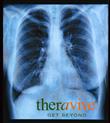November 28, 2013
by LuAnn Pierce, LCSW

Sharing food is thought to be one of the ways that we create bonds and strengthen relationships. While that may be true for most people, the season for gathering around the dinner table is fraught with stress and anxiety for many who have food allergies and special diets.
[More]
November 25, 2013
by Christie Hunter

Anyone who has battled lung cancer or has lost a loved one to the disease knows first hand how horrific it is. Because lung cancer in particular can be avoided, it is very important to know the risks of developing this awful and largely untreatable illness.
[More]
In a short time, we will be gathering around our families and loved ones, reflecting on the things for that which we are thankful. We'll be cherishing the gifts, blessings and happiness that may have come our way this year, paving the way for the holiday season. But what if you're not feeling quite so thankful this year? For many people, finding reasons to be grateful for the good in life may not be so easy, especially if there has been a lot of bad this year.
[More]
November 18, 2013
by Christie Hunter

November is Diabetes Awareness Month. Now would be a good time to start making those difficult lifestyle changes necessary to prevent the disease if you are at risk. If you start making those changes now, you will reduce your risks of developing Type II diabetes, and may even turn back the disease altogether if you have already been diagnosed.
[More]
November 13, 2013
by LuAnn Pierce, LCSW

Critical growth and development occur in the final weeks of pregnancy, so babies that are born early are at risk for a number of medical and cognitive problems. The majority of infant deaths result from very early birth.
[More]
November 10, 2013
by LuAnn Pierce, LCSW

Millions of men have ED. Do you know that medication does not always work? What some of the psychological effects are of ED, and how can it be treated when drugs fail?
[More]
November 9, 2013
by LuAnn Pierce, LCSW

According to the Epilepsy Foundation about 1 in every 26 Americans will develop epilepsy during their lifetime. Two million Americans and 65 million people worldwide have this disease. One third of those live with uncontrolled seizures because none of the treatments work for them. 7 out of 10 cases have unknown causes. There are more people living with epilepsy than with autism, Parkinson's disease, MS and cerebral palsy combined, according to the Epilepsy Foundation.
[More]
January 10, 2013
by Casey Truffo, LMFT

Part of the traditional marriage vows indicate a partner's willingness to remain together in sickness and in health. So, could getting married to remain healthy as good of a reason to tie the knot as love? Many researchers over the years have reported that marriage is good for your health and that healthy married people are less likely to die at the same rate as unmarried people. More recent research agreed that marriage is, in fact, a positive move, up until the point that a person's health begins declining. A 20-year study showed healthy, unmarried people were about 75 percent more likely to have died than married people. So, what does that really mean? At a glance, it seems that marriage encourages people to be healthy due to having a purpose in life; that purpose being that they are depended upon in a relationship by their partner. It makes you wonder if love fades, then, at the same rate as health fades. Some people think that married people are less likely to report having failing health than singles are. On many occasions, it seems that by the time a married person reports their health problems, they may already be very close to the end of their life.
Let's look at all of this in another way. Obviously, those who are in a good, positive marriage will most likely be in better health, if only due to being happy without much drama or stress in their lives. So, that being said, it makes you wonder if men and women show the same health-related advantages as a result of being married. For men, it appears that the happier their marriage, the higher their survival rate. For example, married men who had to undergo heart surgery were more than twice as likely than unmarried men to be alive 10 to 15 years later. For women, the status of their marriage is even more important. Women who are very satisfied with their marriages increase their survival rate almost four times of that of their unmarried counterparts.
It seems that there really is a connection between love and happiness. Married people are likely to be happy with life compared to those who are single, living together, separated, divorced, or widowed. Also worth noting, a good marriage is better for your quality of life than a high-paying job. Married people are less depressed and having fewer mental issues than singles as well. This is likely because of trust in the marriage and the ability to talk about things with your spouse, knowing you will not be judged. There are studies that show mental health increases substantially for marrieds and deteriorates substantially for divorcees or those who are separated. More statistics indicate that marrieds also have lower blood pressure, lower stress levels, and better immune systems.
Obviously, there are other things about marriage to consider. Marriage will not sustain itself. It takes a lot of work and commitment to maintain a wonderful, happy relationship. No marriage goes from start to finish without problems along the way. If you are having problems, such as arguing, not talking at all, or you or your spouse are experiencing low self-esteem, you should seek professional help. In order to maintain a healthy, lovely marriage, it is important to go back to the basics. No doubt you have heard or read all of these things many times before, but it bears repeating that all of these things are the basics for living in a healthy marriage.
Communicate - For any relationship, including marriage, communication is the key to healthy relationships. Poor communication leads to misunderstandings, hurt feelings, and other problems.
Be Positive - Negativity weakens a marriage and will eventually damage it if you are not careful.
Have Sex - Sex is a vital part of a healthy marriage. Remember to hug, kiss, hold hands, and talk. It isn't hard to fall into the cycle of feeling more like roommates than husband and wife.
Understanding and Respect - Understand the way your spouse likes to be loved. Respect your spouse, and show you appreciate your spouse by staying thank you often. Show appreciation to your spouse as often as possible.
Quality Time - Make it a priority to spend time together as a couple in love. This is especially important once children enter your world. If you have to, schedule time for a date on your calendars and take turns choosing where you will go or what you will do on your date. Do this at least once a month; once a week is preferable.
Get Help when Needed - The most important piece of advice is this: Realize that there are trying times in any marriage, and accept the fact that there may be times when you and your spouse need to seek professional help to get you through a crossroads. People change, situations change, and relationships change. What you do not want to happen is to turn into a couple who share a space with no emotional attachment.
The most important consideration is the quality of your marriage. Many different researches have concluded that a happy marriage can add a number of years to your life. Marriage is an important factor to think about, all while making sure to treat your spouse with respect. So, any way you look at it, a strong marriage really is something worth working for.
If you are having issues in your marriage that you cannot seem to work through on your own, as a couple, it is time to seek professional help. Let the trained counselors at the Orange County Relationship Center help you through the rough times so you can maintain a positive relationship with your spouse. Call us today at 949-220-3211, or schedule an appointment online.
The origins of Thanksgiving have nothing to do with a bunch of Indians and pilgrims sitting down for a bountiful feast of turkey. In reality although the settlers with pale faces had been bothering the Indians in addition to giving them many new diseases they had never had were starving by this time. The Indians took pity on them and brought them some corn and fish. Thanksgiving has a lot of emotional disappointment and this article will show you how to deal with this.
This is a period of time in which you are expected to give to others and be generous. Although the intention is good it often leads to self sacrifice and disappointment. This is a period of time in which you must balance your newfound humanitarianism with the demands on your own life. If you do not continue to reach your own immediate goals either at work or at home you will find yourself being irritable and exhausted. Remember that an obligation to give to others does not mean that you have to sacrifice your own needs. You must remember to give yourself some time for your own physical and mental well-being. It is a time when we most often neglect the things we do to make ourselves happy and keep ourselves balanced like exercise, yoga, or other spiritual practices for your own physical and mental well-being This is a time to find some positive solutions to deal with your family members past resentments. Remember that when I family system gets back together it quickly returns to whatever difficulties encountered before. Even if you're the only person in the room aware of this it may help you from dealing with the fallacy that "now that we're all together we must be alright."
This leads to the need to decide on your priorities and organize your time adequately. I this will counteract your feelings that you have not a planned enough for Thanksgiving. If you find additional time you can always volunteer to feed the poor would do random acts of kindness. You may also need to have planned out some unstructured inexpensive holiday activity because this holiday evokes a feeling of being served good food rather than organizing fun things to participate in. Spending some time thinking about this will save the day when you are reunited with your family and no one knows what to do.
One of the major fallacies are that Thanksgiving will take away feelings of loneliness, sadness, fear, anger and frustration. This holiday is heavily advertised is a time in which everyone appreciates being together. The fallacy behind that becomes clear when you are reuniting with family members and you realize why you have become independent of them. You may find yourself being overwhelmed with anger or fear or worse yet feeling alone being surrounded by your family. The worst emotion that creeps up on this holiday is resentment. It is usually triggered by a previous bad relationship with a family member. Beware of grudges and slights you have suffered in the past and keep them from resurfacing.
Thanksgiving is designed to encourage gluttony. This is not an open invitation to eat too much. Remember that most people with eating disorders simply want to have something to control in their lives and to avoid the resentment and self-hatred you will naturally feel after eating way past feeling hungry. This includes other over indulgences. You know by now what you need to keep a careful eye on so that you don't lose control and this may be an opportunity to set an example with other family members who still have raging addictions. You may want to have some contingency plans when they become abusively angry, drunk or chemically impaired.
If it the end of the holiday feast you find yourself still feeling depressed or resentful remember what the Indians did. They didn't like these foreigners who is strange customs and behaviors showed such a resentment towards nature that it disrupted and destroyed the Indian culture. Yet they still took pity on these poor starving people and threw them a fish or two.